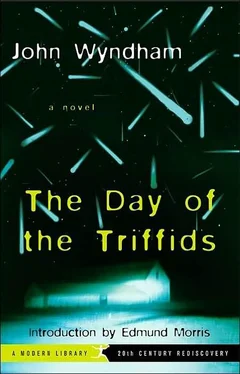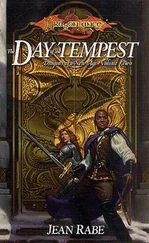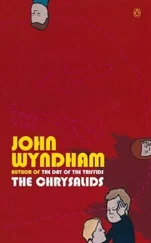By the look of Charcott Old House, it had once been a for-died manor. Refortification Was now under way. At some time in the past the encircling moat had been drained. Stephen, however, was of the opinion tat he had successfully ruined the drainage system so that it would DII up again by degrees. It was his plan to blow out such parts as bad been filled in, and thus complete the reencirclement. Our news, suggesting that this might not be necessary, induced a slight wistfulness in him, and a look of disappointment. The stone walls of the house were thick. At least three of the windows in the front displayed machine guns, and he pointed out two more mounted on the roof. Inside the main door was stacked a smell arsenal of mortars and bombs, and, as he proudly pointed out, several flame throwers.
“We found an arms depot,” be explained, “and spent a day getting this lot together.”
As I looked over the stuff I realized for the first time that the catastrophe, by its very thoroughness, had been more merciful than the things that would have followed a slightly lesser disaster. Had 10 or 15 per cent of the population remained unharmed, it was very likely that little communities like this would indeed have found themselves fighting off starving gangs in order to preserve their own lives. As things were,
however, Stephen had probably made his warlike preparations in vain. But there was one appliance that could he put to good use. I pointed to the flame throwers.
“Those might be handy for triffids,” I said.
He grinned.
“You’re right. Very effective. The one thing we’ve used them for. And, incidentally, the one thing I know that really makes a triffid bear it. You can go on firing at them until they’re shot to bits, and they don’t budge. I suppose they don’t know where the destruction’s coming from. But one warm lick from this and they’re plunging off fit to bust themselves.”
“Have you had a lot of trouble with them?” I asked. It seemed that they had not. From time to time one, perhaps two or three, would approach, and be scorched away. On their expeditions they had had several lucky escapes, but usually they were out of their vehicles only in built-up areas where there was little likelihood of prowling triffids.
That night, after dark, we all went up to the roof. It was too early for the moon. We looked out upon an utterly black landscape. Search it as we would, not one of us was able to discover the least pin point of a telltale light. Nor could any of the party recall ever having seen a trace of smoke by day. I was feeling depressed when we descended again to the lamp-lit living room.
“There’s only one thing for it, then,” Coker said. ‘We’ll have to divide the district up into areas and search them.”
But he did not say it with conviction. I suspected that he was thinking it likely, as I was, that the Headley party would continue to show a deliberate light by night and some other sign—probably a smoke column—by day.
However, no one had any better suggestion to make, so we got down to the business of dividing the map up into sections, doing our best to contrive that each should include some high ground to give an extensive view beyond it.
The following day we went into the town in a truck, and from there dispersed in smaller cars for the search. That was, without a doubt, the most melancholy day I had spent since I had wandered about Westminster searching for traces of Josella there.
Just at first it wasn’t too bad. There was the open road in the sunlight, the fresh green of early summer. There were signposts which pointed to “Exeter & The West,” and other places, as if they still pursued their habitual lives. There were sometimes, though rarely, birds to be seen. And there were wild flowers beside the lanes, looking as they had always looked.
But the other side of the picture was not as good. There were fields in which cattle lay dead or wandered blindly, and untended cows lowed in pain. Where sheep in their easy discouragement had stood resignedly to die rather than pull themselves free from bramble or barbed wire, and other sheep grazed erratically or starved helplessly with looks of reproach in their blind eyes.
Farms were becoming unpleasant places to pass closely. For safety’s sake I was giving myself only an inch of ventilation at the top of the window, but I closed even that whenever I saw a farm beside the road ahead.
Triffids were at large. Sometimes I saw them crossing fields or noticed them inactive against hedges. In more than one farmyard they had found the middens to their liking and enthroned themselves there while they waited for the dead stock to attain the right stage of putrescence. I saw them now with a disgust that they had never roused in me before. Horrible alien things which some of us had somehow created, and which the rest of us, in our careless greed, had cultured all over the world. One could not even blame nature for them. Somehow they had been bred—just as we had bred for ourselves beautiful flowers or grotesque parodies of dogs… I began to loathe them now on account of more than their carrion-eating habits—for they, more than anything else, seemed able to profit and flourish on our disaster…
As the day went on, my sense of loneliness grew. On any bill or rise I stopped to examine the country as far as field glasses would show me. Once I saw smoke and went to the source to find a small railway train burned out on the line— I still do not know how that could be, for there was no one near it. Another time a flag upon a staff sent me hurrying to a house to find it silent—though not empty. Yet another time a white flutter of movement on a distant hillside caught my eye, but when I turned the glasses on it I found it to be half a dozen sheep milling in panic while a triffid struck continually and ineffectively across their woolly backs. Nowhere could I see a sign of living human beings.
When I stopped for food I did not linger longer than I need. I ate it quickly, listening to a silence that was beginning to get on my nerves, and anxious to be on my way again with at least the sound of the car for company.
One began to fancy things. Once I saw an arm waving from a window, but when I got there it was only a branch swaying in front of the window. I saw a man stop in the middle of a field and turn to watch me go by; but the glasses showed me that he couldn’t have stopped or turned: he was a scarecrow. I heard voices calling to me, just discernible above the engine noise; I stopped, and switched off. There were no voices, nothing, but far, far away the plaint of an unmilked cow.
It came to me that here and there, dotted about the country, there must be men and women who were believing themselves to be utterly alone, sole survivors. I felt as sorry for them as for anyone else in the disaster.
During the afternoon, with lowered spirits and little hope, I kept doggedly on, quartering my section of the map, because I dared not risk failing to make my inner certainty sure. At last, however, I satisfied myself that if any sizable party did exist in the area I had been allotted, it was deliberately hiding. It had not been possible for me to cover every lane and by-road, but I was willing to swear that the sound of my by no means feeble horn had been heard in every acre of my sector. I finished up and drove back to the place where we had parked the truck in the gloomiest mood I had yet known. I found that none of the others had shown up yet, so to pass the time, and because I needed it to keep out the spiritual cold, I turned into the nearby pub and poured myself a good brandy.
Stephen was the next to return. The expedition seemed to have affected him much as it bad me, for he shook his head us answer to my questioning look and made straight for the bottle I had opened. Ten minutes later the radio ambitionist joined us. He brought with him a disheveled, wild-eyed young man who appeared not to have washed or shaved for several weeks. This person had been on the road; it was, it seemed, his only profession. One evening, he could not say for certain of what day, he had found a fine comfortable barn in which to spend the night. Having done somewhat more than his usual quota of miles that day, he had fallen asleep almost as soon as he lay down. The next morning he had awakened in a nightmare, and he still seemed a little uncertain whether it was the world or himself that was crazy. We reckoned he was a little, anyway, but he still retained a clear knowledge of the use of beer.
Читать дальше











